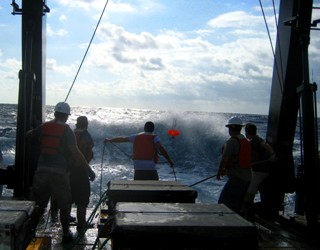Oct 8 2014
Scientists have a good understanding of how air pollution impacts human health and the terrestrial biosphere, but what impact does air pollution have on oceans? To help answer this question, this past August, researchers from Penn State's department of meteorology embarked on a three-week, NSF-funded field project to catch and analyze rainwater at sea.
 Penn State researchers Douglas Martins (left) and Raymond Najjar (4th from left) look on as ship's crew retrieve a drifter using a grapple. Image: Stefanie Mack/Old Dominion University.
Penn State researchers Douglas Martins (left) and Raymond Najjar (4th from left) look on as ship's crew retrieve a drifter using a grapple. Image: Stefanie Mack/Old Dominion University.
"The atmospheric deposition of nitrogen to coastal waters is one of many ways in which humans influence the ocean," says Raymond Najjar, professor of meteorology, and a principal investigator on the project. "This study is important because it is the first to directly measure the impact of nitrogen deposition on the productivity of coastal waters."
Nitrogen is a naturally-occurring element essential for the growth of all living organisms; however, in aquatic systems, excess nitrogen can stimulate an explosive growth of plants and algae, which deplete oxygen levels when they die and decompose.
As a byproduct of combustion, nitric oxide (NO) from cars, trucks, biomass burning and energy production is emitted to the atmosphere. Additionally, a substantial amount of nitrogen enters the atmosphere as ammonia from agricultural activity. Given a general west-to-east flow of meteorological systems across the United States, the coastal marine systems of the eastern seaboard receive significant atmospheric nitrogen loadings, yet the biological impact of these loadings remains poorly understood.
The nitrogen that falls in rainwater can be a nutrient for some biological processes. It can be taken up by phytoplankton and other biomass and used for the production of amino acids and proteins. Since nitrogen is often a limiting nutrient in the open waters of oceans, the deposition from the atmosphere can be a stimulant to the system.
For "Deposition of Atmospheric Nitrogen to Coastal Ecosystems," or DANCE, the NSF-funded project, the researchers collected air and water samples in the coastal waters located between the Delaware Bay and the coastal Carolinas to investigate whether atmospheric nitrogen loadings from precipitation following summer storms stimulate primary productivity and accumulation of algal biomass in coastal waters.
The Penn State team, in collaboration with researchers from Old Dominion University and the College of William & Mary's Virginia Institute of Marine Science, collected their measurements on board the R/V Hugh R. Sharp, operated by the University of Delaware out of Lewes, DE.
Meteorological forecasts, developed on board by doctoral candidate Daniel Tomaso, directed the ship to intercept rain events. The challenge of marine forecasting is the lack of real-time data from established weather stations, which meteorologists have become accustomed to over land. Despite the challenges, the ship intercepted numerous rain events.
"I now have a new appreciation for weather at sea in addition to the vastness of the ocean," says Tomaso.
Air quality measurements, collected by research associate Douglas Martins, characterized the pollution coming from terrestrial air masses.
"The measurements will be used to calculate the amount of dry deposition of nitrogen to the ocean surface as well as to improve numerical models that predict the impacts of nitrogen deposition," says Najjar.
"This project highlights the interdisciplinary nature of earth system science," says Martins. The atmosphere touches everything we can see. Even in remote locations such as the middle of the ocean, we can still see impacts from humans."